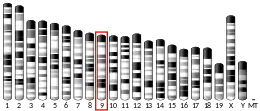STT3B
Dolichyl-diphosphooligosaccharide—protein glycosyltransferase subunit STT3B is an enzyme that in humans is encoded by the STT3B gene.[5][6][7]
Function
The STT3B protein contains a highly immunogenic minor histocompatibility antigen epitope of 9 amino acids, B6(dom1). Like ITM1 (MIM 601134), STT3B is homologous to yeast STT3, an oligosaccharyltransferase essential for cell proliferation.[8][7]
See also
References
- GRCh38: Ensembl release 89: ENSG00000163527 - Ensembl, May 2017
- GRCm38: Ensembl release 89: ENSMUSG00000032437 - Ensembl, May 2017
- "Human PubMed Reference:". National Center for Biotechnology Information, U.S. National Library of Medicine.
- "Mouse PubMed Reference:". National Center for Biotechnology Information, U.S. National Library of Medicine.
- Kelleher DJ, Karaoglu D, Mandon EC, Gilmore R (July 2003). "Oligosaccharyltransferase isoforms that contain different catalytic STT3 subunits have distinct enzymatic properties". Molecular Cell. 12 (1): 101–11. doi:10.1016/S1097-2765(03)00243-0. PMID 12887896.
- McBride K, Baron C, Picard S, Martin S, Boismenu D, Bell A, et al. (November 2002). "The model B6(dom1) minor histocompatibility antigen is encoded by a mouse homolog of the yeast STT3 gene". Immunogenetics. 54 (8): 562–9. doi:10.1007/s00251-002-0502-4. PMID 12439619. S2CID 25068432.
- "Entrez Gene: STT3B STT3, subunit of the oligosaccharyltransferase complex, homolog B (S. cerevisiae)".
- McBride K, Baron C, Picard S, Martin S, Boismenu D, Bell A, et al. (November 2002). "The model B6(dom1) minor histocompatibility antigen is encoded by a mouse homolog of the yeast STT3 gene". Immunogenetics. Springer Science and Business Media LLC. 54 (8): 562–9. doi:10.1007/s00251-002-0502-4. PMID 12439619. S2CID 25068432.
Further reading
- Olsen JV, Blagoev B, Gnad F, Macek B, Kumar C, Mortensen P, Mann M (November 2006). "Global, in vivo, and site-specific phosphorylation dynamics in signaling networks". Cell. 127 (3): 635–48. doi:10.1016/j.cell.2006.09.026. PMID 17081983. S2CID 7827573.
- Otsuki T, Ota T, Nishikawa T, Hayashi K, Suzuki Y, Yamamoto J, et al. (2007). "Signal sequence and keyword trap in silico for selection of full-length human cDNAs encoding secretion or membrane proteins from oligo-capped cDNA libraries". DNA Research. 12 (2): 117–26. doi:10.1093/dnares/12.2.117. PMID 16303743.
- Shibatani T, David LL, McCormack AL, Frueh K, Skach WR (April 2005). "Proteomic analysis of mammalian oligosaccharyltransferase reveals multiple subcomplexes that contain Sec61, TRAP, and two potential new subunits". Biochemistry. 44 (16): 5982–92. doi:10.1021/bi047328f. PMID 15835887.
This article is issued from Wikipedia. The text is licensed under Creative Commons - Attribution - Sharealike. Additional terms may apply for the media files.



